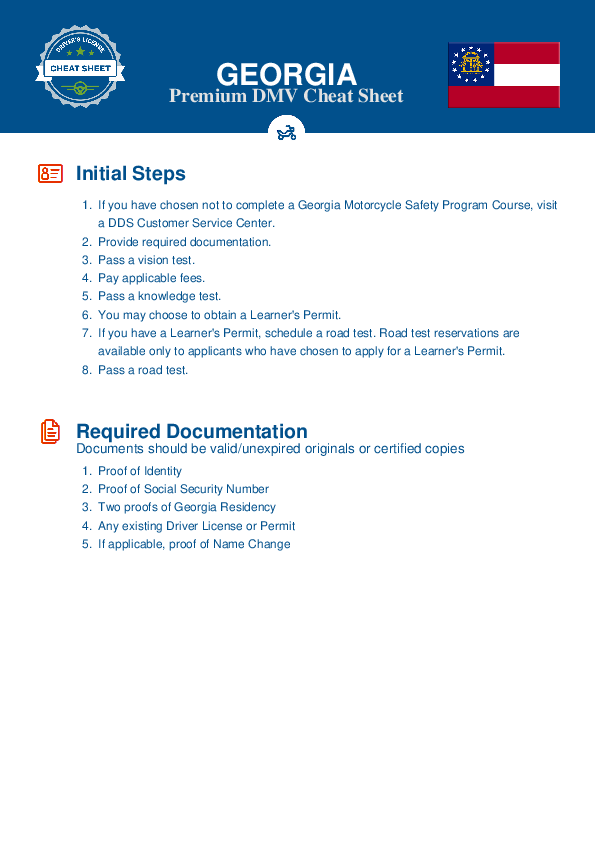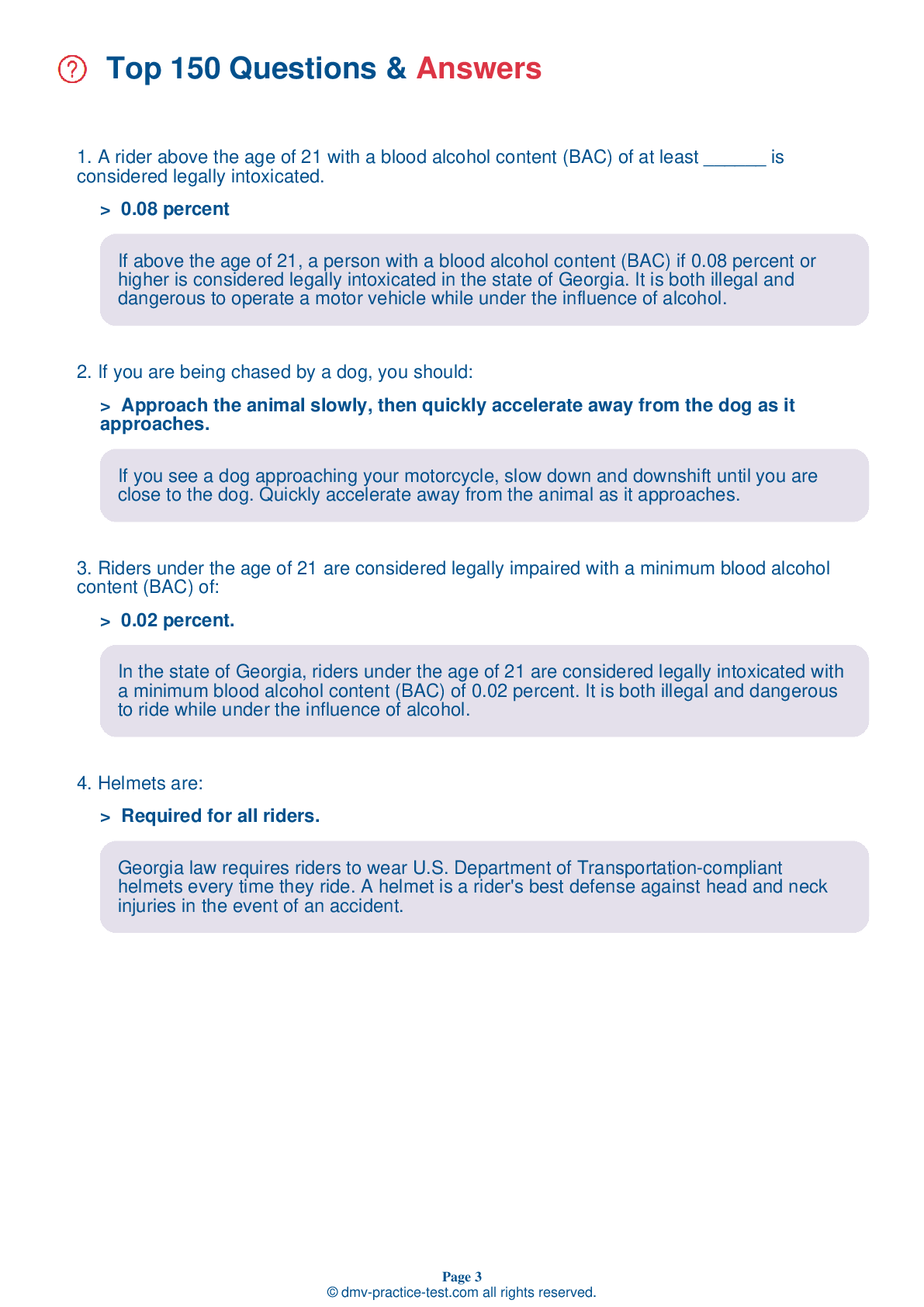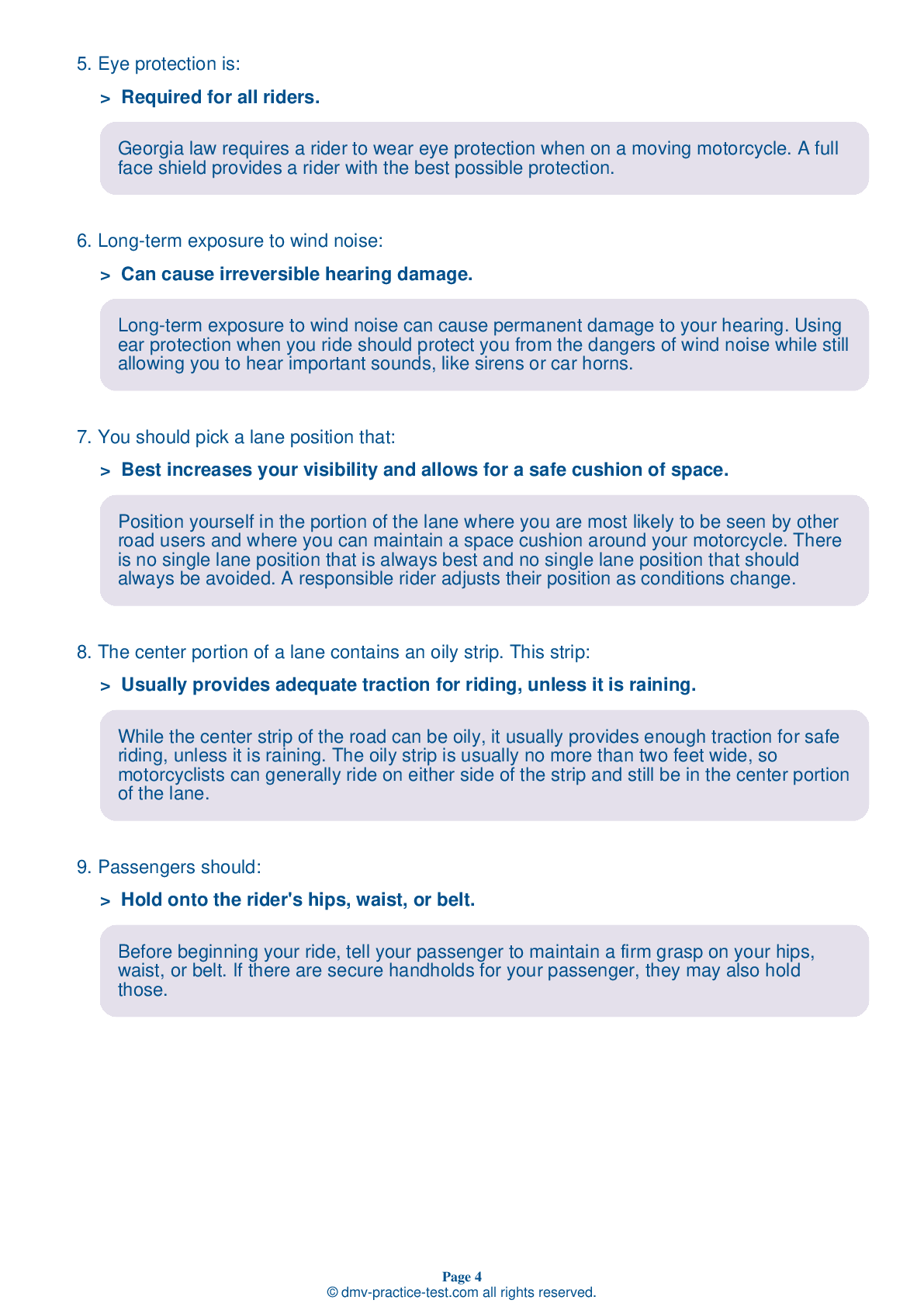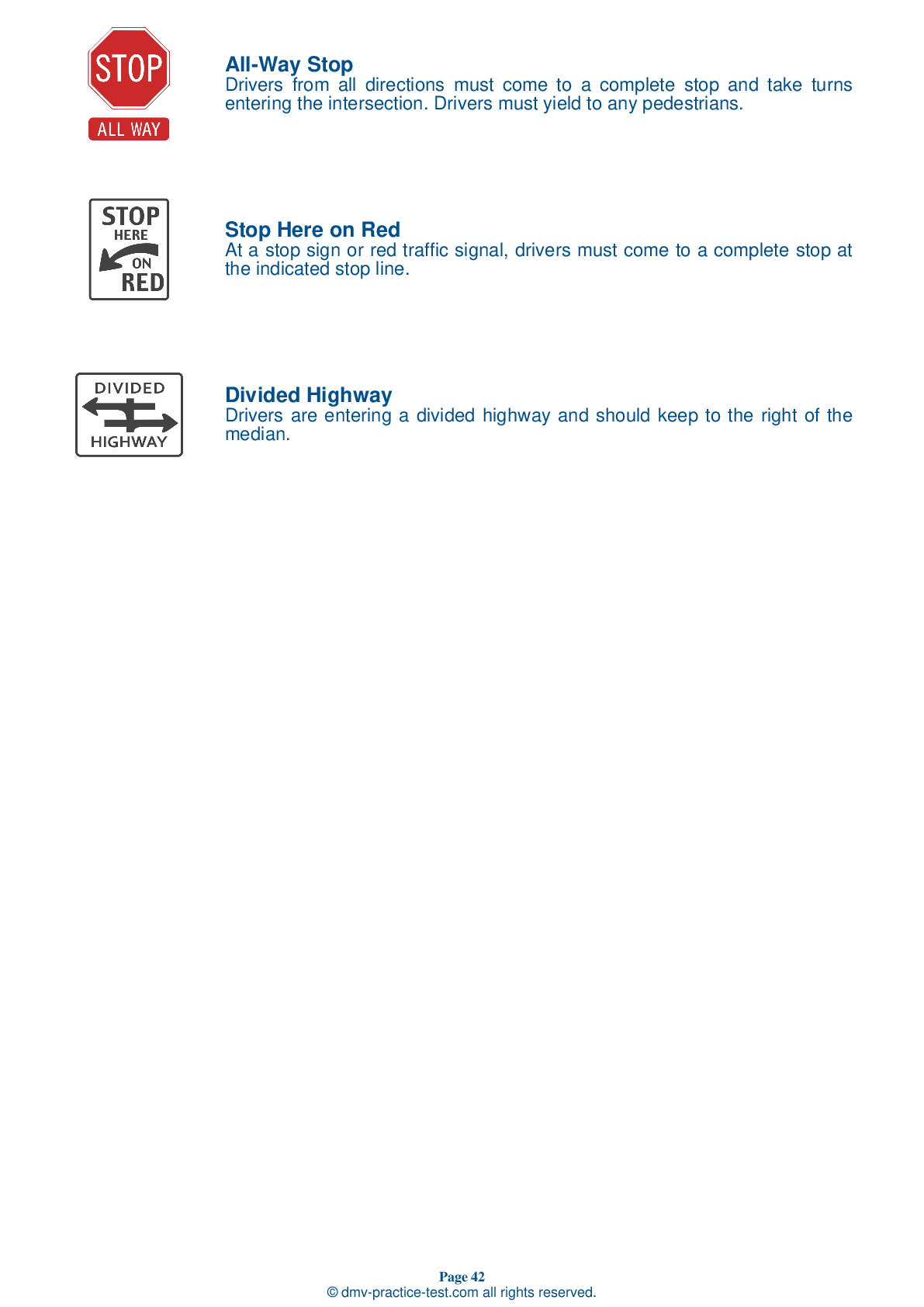DMV Permit Test #6
Motorcycle Test | License GA 2026 | FREE Online Practice! #6
Take this FREE motorcycle test (license in GA 2026) to check your knowledge of the road rules. To improve your results, download a motorcycle handbook online, study theory, and practice for free on our website. Still worried about how to get a motorcycle license in Georgia in 2026? Check our website for more sample tests, train as much as possible, and boost your grades!
20
15
16
1 . While braking a motorcycle with a sidecar, you may need to:
A sidecar adds additional weight to one side of your motorcycle. You may need to steer slightly in the direction of the sidecar when applying your motorcycle's brakes if the sidecar is not also equipped with brakes.
2 . What should be your first consideration when buying a motorcycle helmet?
Protection should be your first consideration when buying a motorcycle helmet. Look for a helmet that fastens securely, fits correctly, and is DOT-compliant.
3 . To minimize the potential for fatigue on a long trip, you should:
When taking a long trip, be sure to schedule in frequent breaks to rest, even if you do not feel tired. Experienced operators seldom try to ride for longer than six hours a day. Wind, cold, and rain can make you tire quickly, so be sure to dress to protect yourself from the elements.
4 . You are riding over bridge gratings and your motorcycle has begun to weave. You should:
If your motorcycle begins to weave while you are traveling over bridge gratings, you should simply maintain a steady speed and proceed straight across the surface. Trying to stay in your lane while riding in a zigzagging motion is dangerous.
5 . How can you get sober after drinking alcohol?
The only way to sober up after drinking is to give your body the time it needs to remove the alcohol. There are no techniques that will speed up this process.
Need Motorcycle Insurance? No problem!
Compare the best rates in Georgia and find a personalized policy that meets your needs.
1. Are You Currently insured ?
2. Married ?
3. Do you own your Home?
4. Have you or a Family Member Honorably Served in U.S. Military ?
5. Your Name
6. Age
7. Zip code
Ranked by best match
2026 Georgia | Frequently Asked Questions
To acquire a motorcycle license in Georgia, you must first obtain a motorcycle permit by passing a written exam. After gaining some experience, you can apply for a Class M license. This requires passing a road skills test. Alternatively, completion of a Georgia Motorcycle Safety Program course can waive these tests. Applicants under 18 must also complete a driver's education course.
In Georgia, the minimum age for obtaining a motorcycle driver's license is 16 years. However, applicants under 18 years must complete a driver education course and have a parent or guardian's consent. They must also hold an instructional permit for one year and one day with no traffic convictions.
Yes, in Georgia, you need a dedicated motorcycle license known as Class M to legally ride a motorcycle. If you already have a regular driver's license, you can get a motorcycle endorsement. If you don't have a regular license, you can obtain a Class M license after passing the necessary written and road tests.
To apply for a motorcycle driver's license in Georgia, you'll need a valid Georgia driver's license, proof of identity, proof of residency, and proof of US citizenship or lawful presence in the US. You also need to pass a vision test, written exam and on-cycle skills test. If under 18, parental consent is required.
Yes, you will need to take a written exam to obtain a motorcycle license in Georgia. The test covers topics such as motorcycle safety, operation, and traffic laws. This requirement can be waived if you successfully complete a Georgia Motorcycle Safety Program Course. However, passing the on-cycle skills test is still necessary.
The motorcycle written test in Georgia covers a variety of topics including: basic traffic laws, safe riding practices, risk management, riding under the influence, protective gear, motorcycle controls and operation, and handling various road and traffic conditions. All these subjects are covered in the Georgia Motorcycle Operator's Manual.
Yes, in Georgia, if you successfully complete a Georgia Motorcycle Safety Program Course, the written test requirement for a motorcycle license can be waived. However, you will still need to pass the on-cycle skills test. This program is recommended for both new and experienced riders to enhance their skills and safety knowledge.
To enroll in a motorcycle training course in Georgia, visit the Georgia Motorcycle Safety Program (GMSP) website. Select a Basic Rider Course (BRC) or Experienced Rider Course (ERC), depending on your skill level. Choose a convenient location and date, then register and pay the course fee online. You'll need to bring your own gear, but motorcycles are often provided.
No, you don't need to own a motorcycle for the license test in Georgia. You can use any motorcycle that is insured, registered and meets all safety requirements. However, you must have permission from the owner to use it for the test.
Yes, you can use a friend's motorcycle for the driver's license evaluation in Georgia, as long as the motorcycle is registered, insured, and meets all safety requirements. Remember, you must also have permission from the owner to use the motorcycle for this purpose.
Yes, Georgia's motorcycle driving exam tests specific handling skills. These include left and right turns, sudden stops, swerving or avoiding hazards, accelerating, decelerating, changing lanes and negotiating intersections. The test evaluates your ability to control the motorcycle under various traffic conditions and your understanding of road rules.
Yes, Georgia has a Graduated Driver Licensing (GDL) program for new drivers under 18. This includes a Class MP instructional permit with restrictions like no riding after dark and no passengers. After one year and a day, and at least 16 years old, riders can upgrade to a Class M license by passing a road skills test.
Yes, your Georgia motorcycle license (Class M) allows you to legally operate a motorcycle in other states. However, you must follow the traffic laws of the state you're in, as they may vary from Georgia's. It's always a good idea to familiarize yourself with the local laws when traveling out of state.
Yes, in Georgia, wearing a helmet is mandatory for all motorcycle operators and passengers. Georgia law requires the helmet to meet the standards set by the Georgia Commissioner of Public Safety, which generally align with federal Department of Transportation (DOT) standards. This rule applies regardless of age or experience level.
In Georgia, there's primarily one type of motorcycle license, which is the Class M license. However, there are two categories: the M-P (Motorcycle Permit) for learners and the full Class M license for those who have passed the necessary tests. The Class M license allows you to operate motorcycles and motor-driven cycles on Georgia roads.
Yes, you can add supplementary endorsements to your motorcycle license in Georgia. One common endorsement is the "M" endorsement, which allows you to operate motorcycles. To add an endorsement, you must pass the respective knowledge and skills tests and pay the required fees at the Georgia Department of Driver Services.
Yes, the Georgia Department of Driver Services offers the motorcycle license test in several languages other than English. These include Spanish, Chinese, Vietnamese, Korean, and Russian. However, it's advisable to check with your local DDS Customer Service Center to confirm the availability of your preferred language.
An effective strategy to prepare for the motorcycle license test includes studying the Georgia Motorcycle Operator's Manual thoroughly, taking practice tests available online, and understanding all road signs and signals. Also, enrolling in a motorcycle safety course can provide practical knowledge and hands-on experience which can be very useful.
Yes, the Georgia Department of Driver Services offers the motorcycle written exam in multiple languages besides English. These include Spanish, Chinese, Vietnamese, Korean, and Russian. However, it's advisable to contact your local DDS Customer Service Center beforehand to confirm availability.
If you don't pass the motorcycle written test in Georgia, you are allowed to retake it. However, you must wait at least one day before retaking the test. If you fail the test three times, you must wait seven days before attempting it again. It's recommended to study thoroughly before each attempt.



